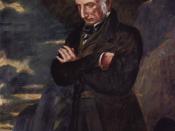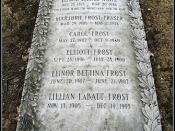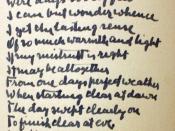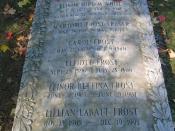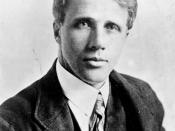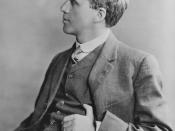"The past is redeemable through memory, imagination and retrospection, and through these powers of mind, an order and continuity are given to one's life"ÃÂ. Such is the belief that Robert Frost adopted from Wordsworth and can be said to be the theme of Frost's poem "ÃÂDirective'.
The poem begins in the voice of a guide, directing us out of the present, the "now"ÃÂ that is "too much for us"ÃÂ and leading us to, or rather leading us to retreat to "a time made simple by the loss/ of detail, burned, dissolved, and broken off."ÃÂ (2-3) The speaker in the poem "ÃÂDirective' is the poet, Frost. He wishes to lead the reader to his "hippocrene, the origin of all language, thought and form"ÃÂ. (The Hippocrene was the spring on Mount Helicon which was regarded as a source of poetic inspiration). Frost is going back in time to his literary roots, which center or revolve around the spring and the Grail-like goblet.
These symbols are the monuments of both Wordsworth and the Bible, thus, the poem can therefore be seen as a tribute to Frost's sources and inspirations. The poem "effectively summarizes Frost's romanticism in advocating the esthetic wholeness that is integral to spiritual unity"ÃÂ.
In every line and every detail, Frost is justifying the conception of his poetry and imagination with symbolism. The playhouse, for example, left standing because Frost believes that play and play-acting "make up the house of poetry"ÃÂ.
Another example of symbolism used in the poem is the stream, which is associated with beginnings, endings and a source of knowledge and being. This stream is the reader's destination and where the guide wants to lead you; to be so lost that you are able to find yourself.
What, however, does one mean when they say find yourself? Frost wishes for us, the readers, to lose ourselves, because it is only when we are lost that we can be found and it is only when "we lose our egotism"ÃÂ and "abandon ourselves to art and mediation"ÃÂ that we can "find ourselves in spiritual thought"ÃÂ.
In Frost's case, he wishes for the reader to find clarity and salvation, or perhaps, for the lucky ones, even Utopia. The poet himself seeks "the pastoral source of intellectual vitality; the upward path, the spring, and the hoped-for renewal of love"ÃÂ.
Amid all ruin and dilapidation, shattered dishes, crumbled houses and deserted villages, our guide leads us to a waiting vision. "The poem is an imaginative "ÃÂdeparture' or excursion to primal roots, where the poet draws his life"ÃÂ.
The world that our guide describes is largely fragmented, representing the present world, or one that Frost sees as a world in which everyone is lost. To be found is to disconnect oneself from the fragmentation and find the wholeness, thereby finding the source.
Our guide has been found, and has found himself, and now wishes the same for his readers. How does he achieve this? By enforcing the fact that it is necessary to be lost in order to be found and by stating that those who deserve to find the source will, and those who don't will not. By those who do not, he means those who do not care enough to find it or those who are not yet lost enough. He also aids the reader by guiding them by the hand to the ultimate source which results in the reader being "whole again beyond confusion"ÃÂ. (62) In the last section of the poem, our guide becomes our prophet, in which he shows us the way to "salvation"ÃÂ. He directs us to a grail-shaped goblet, located, quite appropriately and literally, at the "root of life"ÃÂ , the instep/ of an old cedar."ÃÂ(55-56) The grail-goblet is "the container of faith and knowledge"ÃÂ.
The goblet and the water that fills it have been the direction and the directive of the poem; the final destination is these "literary and inspirational waters"ÃÂ. Our guide has reached his goal as we have ours: "the sources of creative and intellectual strength"ÃÂ.
Frost, our guide, describes the stream as being "Your destination and your destiny's/ A brook that was the water of the house,/ Cold as a spring as yet so near its source,/ Too lofty and original to rage."ÃÂ (49-52) The grail containing these waters is our destiny, the whole of everything that we can know and believe.
Sources Cited 1 ) D'Avanzo. A Cloud of Other Poets . (Maryland: University Press of America, 1991) 2 ) Fleissner, Robert F. Frost's Road Taken . (New York: Peter Lang Publishing, 1996)
